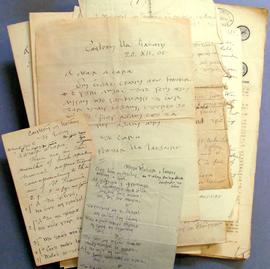This subseries includes a large collection of the correspondence of Fr. Senan Moynihan OFM Cap. The subseries includes letters from many prominent Irish political, literary, artistic, and religious figures. Notable correspondents include Maud Gonne MacBride, Jack B. Yeats, Georgie Yeats, Seán O’Sullivan, Michael Healy, and the sculptors Clare Sheridan and Seamus Murphy. Prominent Irish writers represented in the correspondence include Pearse Hutchison, Benedict Kiely, Seamus MacManus, Francis MacManus, Francis McCullagh, Kathleen M. Murphy, William Frederick Paul Stockley, Germaine Stockley, Ernie O'Malley, Daniel Corkery, Máirín Cregan, D.L. Kelleher, Helena Concannon, Alice Curtayne, and Denis Gywnn. Other notable correspondents include Aodh de Blacam, Frank Duff, Aloys Georg Fleishmann, Michael A. Bowles (the founder of the National Symphony Orchestra), Frank Ryan, Thomas MacGreevey, Sophie Raffalovich O’Brien, Robert Monteith, T.J. Kiernan, Margaret Mary Pearse, Joseph Patrick Walshe (Irish Ambassador to the Holy See), Victor Waddington, and Charles E. Kelly. The collection also includes letters from significant political figures such as Seán T. O’Kelly, Gerald Boland, James Ryan, Richard Mulcahy, and Seán MacBride.
Letters from several Irish language authors and cultural revivalist figures such as Monsignor Pádraig De Brún, Tomás Ó Con Cheanainn, Seán Ó Súilleabháin, Seán Ó Cuirrín, Tadhg Ó Donnchadha (‘Torna’), Pádraig Ó Siochfhradha (‘An Seabhac’), Tomás Ó Muircheartaigh, Seán Ó Ciarghusa, Gearóid Mac Spealáin, Aindrias Ó Muimhneacháin and Críostóir Ó Floinn are also present in the collection. There are also many letters from prominent religious and church figures such as Archbishop John D’Alton, Archbishop Joseph Walsh, Bishop William MacNeely, Fr. Thomas O’Donnell CM (Rector of All Hallows College, Dublin), Archbishop Redmond Prendiville, Archbishop Thomas O’Donnell, Fr. Paschal Robinson OFM, Archbishop Gerald O’Hara, Bishop John Dignan, Archbishop Anselm Edward John Kenealy OFM Cap., Archbishop Sylvester Mulligan OFM Cap., Canon Patrick Rogers, Fr. Terence L. Connolly SJ (Librarian, Boston College, Massachusetts), and Bishop Timothy Phelim O’Shea OFM Cap. Fr. Senan’s most prolific correspondent (in terms of quantity of letters) was Joseph O’Connor (Seosamh Ó Conchubhair), a writer from Fossa near Killarney in County Kerry. O’Connor seemingly exerted an early literary influence on Fr. Senan who consistently addressed him as ‘teacher’. The writer invariably signed his letters to Fr. Senan by using the pen name ‘Jocundus’. The files also include letters from Capuchin friars, advertisers, sales representatives, printers, and other individuals involved in the production of the ‘The Capuchin Annual’.



